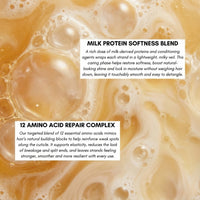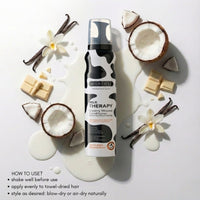The Nutrient-Packed Powerhouses: Best Foods for Healthy Hair
Posted by MORFOSE COSMETICS

The Nutrient-Packed Powerhouses: Best Foods for Healthy Hair
Introduction
Your hair is not only a reflection of your overall health but also a canvas for self-expression. To maintain lustrous and vibrant hair, it's essential to nourish it from within. The foods you consume play a significant role in the health and appearance of your hair. In this article, we will explore a variety of nutrient-rich foods that can contribute to strong, shiny, and healthy locks.The Role of Nutrition in Hair Health
Nutrients Essential for Hair GrowthThe Impact of Diet on Hair Quality
Building Blocks for Stronger Strands
Protein-Packed Foods
Lean Meats and PoultryFish Rich in Omega-3 Fatty Acids
Plant-Based Protein Sources
Vitamins for Vibrant Hair
Vitamin A for Scalp HealthB Vitamins for Hair Growth
Vitamin C for Collagen Production
Minerals for Stronger Strands
Iron-Rich Foods for Preventing Hair LossZinc for Scalp Health
Selenium for Hair Texture
Omega-3 Fatty Acids for Shine and Resilience
Fatty Fish and FlaxseedsWalnuts and Chia Seeds
Antioxidant-Rich Foods
Berries for Protection against Free RadicalsLeafy Greens for Nutrient Absorption
Colorful Vegetables for Hair Vitality
The Role of Nutrition in Hair Health
Nutrients Essential for Hair Growth
A balanced diet provides the necessary nutrients for hair growth, including proteins, vitamins, minerals, and healthy fats. These nutrients work together to maintain the health of hair follicles and promote hair growth.The Impact of Diet on Hair Quality
Just as your body thrives on a well-rounded diet, your hair benefits from a variety of nutrients. A deficiency in certain vitamins and minerals can lead to hair thinning, dullness, and brittleness.Building Blocks for Stronger Strands
Proteins, especially keratin, are the building blocks of hair. A diet rich in high-quality protein sources supports the production of strong and resilient hair.
Protein-Packed Foods
Lean Meats and Poultry
Lean meats and poultry are excellent sources of protein, iron, and zinc, which are essential for healthy hair growth. These nutrients help carry oxygen to the hair follicles, promoting growth and preventing hair loss.Fish Rich in Omega-3 Fatty Acids
Fatty fish, such as salmon and mackerel, are not only rich in protein but also packed with omega-3 fatty acids. These healthy fats contribute to scalp health and add shine to your hair.Plant-Based Protein Sources
For those following a plant-based diet, there are plenty of protein-rich options such as legumes, lentils, quinoa, and tofu. These sources provide amino acids necessary for hair structure.Vitamins for Vibrant Hair
Vitamin A for Scalp Health
Vitamin A plays a vital role in the production of sebum, the natural oil that keeps your scalp moisturized. Including foods like sweet potatoes, carrots, and spinach can support a healthy scalp.B Vitamins for Hair Growth
B vitamins, including biotin, niacin, and cobalamin, are essential for hair growth and overall hair health. Whole grains, eggs, nuts, and leafy greens are rich sources of B vitamins.Vitamin C for Collagen Production
Vitamin C is an antioxidant that aids in the production of collagen, a protein that strengthens hair strands. Citrus fruits, strawberries, and bell peppers are excellent sources of vitamin C.
Minerals for Stronger Strands
Iron-Rich Foods for Preventing Hair Loss
Iron deficiency can lead to hair loss. Including iron-rich foods such as lean red meat, lentils, and spinach in your diet can help prevent hair thinning.Zinc for Scalp Health
Zinc is essential for maintaining a healthy scalp and promoting hair growth. Foods like pumpkin seeds, chickpeas, and yogurt provide a good dose of this mineral.Selenium for Hair Texture
Selenium is involved in the production of selenoproteins, which help regulate hair growth. Brazil nuts, fish, and whole grains are sources of selenium.Omega-3 Fatty Acids for Shine and Resilience
Fatty Fish and Flaxseeds
Omega-3 fatty acids contribute to scalp health by reducing inflammation and increasing blood circulation. Fatty fish like salmon and flaxseeds are excellent sources.Walnuts and Chia Seeds
Walnuts are rich in alpha-linolenic acid (ALA), a type of omega-3 fatty acid. Chia seeds are also abundant in ALA and can be easily incorporated into your diet.Antioxidant-Rich Foods
Berries for Protection against Free Radicals
Berries are packed with antioxidants that protect hair follicles from damage caused by free radicals. Blueberries, strawberries, and raspberries are all great choices.Leafy Greens for Nutrient Absorption
Leafy greens like spinach and kale are high in iron and vitamin C. The combination of these nutrients enhances iron absorption, promoting healthy hair growth.Colorful Vegetables for Hair Vitality
Vibrantly colored vegetables, such as bell peppers and carrots, contain a variety of vitamins and minerals that contribute to hair vitality and strength.
Conclusion
A well-rounded diet rich in a variety of nutrients is the foundation for healthy and vibrant hair. Including protein-rich foods, vitamins, minerals, omega-3 fatty acids, and antioxidant-packed fruits and vegetables in your diet can make a noticeable difference in the health and appearance of your locks.



